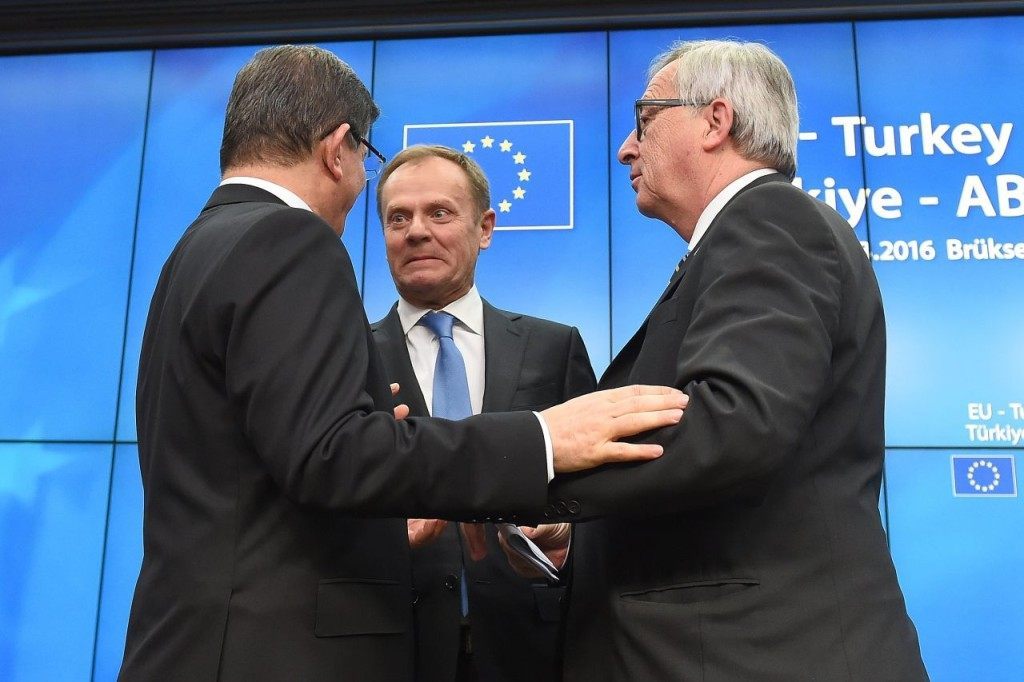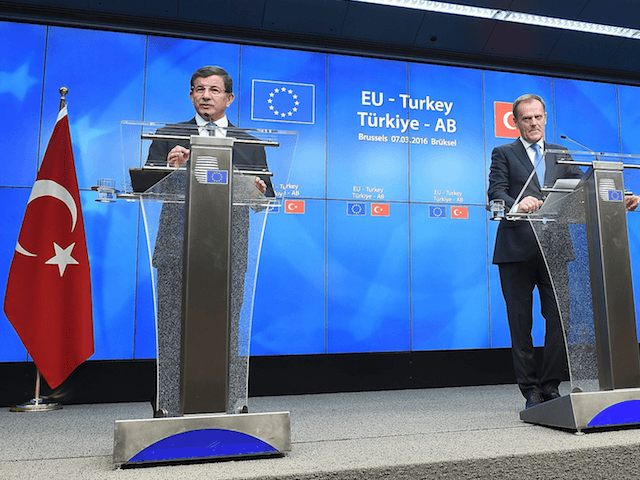Turkey drove a hard bargain at yesterday’s talks with the EU, doubling the amount of money previously promised by EU leaders to €6 billion and securing accelerated access to the Schengen free movement zone for its 75 million citizens.
The UK has been forced to contribute £250 million to the ‘bribe’, despite not being part of the free movement area and so not part of what was described as a “Schengen crisis.” That sum could have been much large if Turkey got the €20 billion they allegedly demanded upon entering the talks yesterday.
According to the deal, boats will be turned back from the Greek shore, which is just a few hundred metres from Turkey. But for every Syrian returned to Turkey, one already processed as a refugee will be taken to Europe from a camp in Turkey.
Hungary’s right-wing president, Viktor Orban, threatened to veto the entire plan if there was any question that the resettlements would be carried via compulsory quotas.
For the return of non-Syrian migrants — mostly from Pakistan and Algeria — from Greece, Turkey’s 75 million citizens have been promised quick access to borderless Europe.
Some have pointed out that the deal is, therefore, unlikely to reduce the number of migrants entering Europe from the Muslim world overall. However, for European leaders it would reduce illegal immigration and the unwelcome media spectacle of overflowing boats and migrants overrunning Europe on foot.
Others sceptics have questioned why Europe must pay for the all of the municipal infrastructure costs, health, education and material support required by all of the Syrian refugees who remain in Turkey, as has been agreed.
Furthermore, the UN has already warned that the plan to return Syrians, Afghans and Iraqis to Turkey might be in breach of international humanitarian law. The current agreement is only “in principle” and will be finalised in a week.
France, Cyprus and other countries in the Schengen zone were also angered by German Chancellor Angela Merkel’s failure to consult on key issues, such as early visa liberalisation for 75 million Turks before the summit, the Times reports.
“As anyone who has shopped in Istanbul’s Grand Bazaar knows, the Turks drive a hard bargain,” an EU diplomat said.

Turkey’s Prime Minister Ahmet Davutoglu, European Council President Donald Tusk and European Commission President Jean-Claude Juncker shake hands after the conference. Brussels, March 8, 2016 (Getty)
David Davis, a senior Tory MP backing Brexit, accused David Cameron of surrendering to Turkish blackmail and of allowing Britain to be sucked into a crisis caused by the failings of the EU’s borderless Schengen zone.
“Presumably this money is to bail out Schengen, so I find it hard to see on what legal basis we are being told to pay towards it, unless this is a voluntary sum, in which case tougher negotiations need to be had,” he said.
Adding: “I wouldn’t be paying them money at the moment on a blackmail basis.”
Meanwhile, the Turkish Prime Minister Ahmet Davutoglu called the deal a “game-changing” plan. The British Prime Minister agreed. “We do have the basis for a breakthrough which is the possibility that in future all migrants who arrive in Greece will be returned to Turkey”, he said.
Writing in the Times Red Box yesterday, UKIP’s migration spokesman Steven Woolfe MEP argued that the short-term benefits of the deal would be vastly outweighed by the long term economic, political, and security effects of allowing Turkey to join the EU. He wrote:
“Turkey wants to join the EU and has the support of both David Cameron and Angela Merkel. Today’s EU-Turkey summit is one step on the road to them becoming the next member of this failing European club.
“It means that if we stay in the EU we will open our borders to a rapidly growing population. It grew from under 50 million in 1985 to 78.7 million in 2015. It is projected to overtake Germany’s declining population by 2018 and reach over 95 million by 2050.
“Turkey would therefore have the largest population in the EU, have the most MEPs in the European Parliament and the biggest voting power of any member state under the qualified majority voting system. The minimal influence Britain currently holds within the EU would be further watered down by them joining.
“But the risk is greater than just EU voting rights. Turkey has a GDP per capita less than one quarter of the UK’s and on a par with Romania and Bulgaria. Our living standards and minimum wage have proved a magnet for Romanian and Bulgarian economic migrants – and this will be no different with Turkey.”
Turkey has already been slammed by the EU for doing virtually nothing to stem migrant numbers since the deal was first agreed, and on the 11th of January President Erdoğan promised to “open the gates” to hundred of thousands of migrants who could be transported into Europe by “bus” and even “plane”, unless his demands were met.
“Turkey is not blackmailing Europe but it’s disheartening to see that Europe only remembered Turkey after the migrant crisis last summer,” insisted Turkey’s deputy ambassador to Britain yesterday.

COMMENTS
Please let us know if you're having issues with commenting.